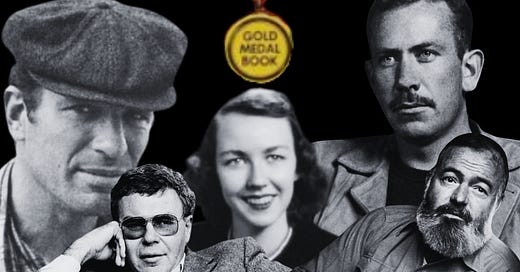5 ‘Serious Authors’ Who Could Have Been Crime Fiction Icons
Forget Pulitzers, who wins the Paperbacks?
I was listening to The Elmore Leonard Podcast the other day and I heard a fascinating tidbit. It turns out crime fiction master Leonard exchanged letters with short story genius Raymond Carver. These were two prose powerhouses whose work I enjoy and admire. My imagination went wild and I immediately wondered how a Carver crime story would play. I decided it would have been awesome. Next, I wondered which other so-called “serious literary authors” could have slid right into the Gold Medal Paperback lineup and written some sharp, smart crime fiction.
RAYMOND CARVER He never wrote a detective novel, but he had noir somewhere deep within his bones. His short story “Tell the Women We’re Going” is essentially a crime story. It’s spare, bleak, and shot through with violence. Carver’s famous minimalist style, honed under the prose-chopping chainsaw of editor Gordon Lish, was tailor-made for really any pulp genre. Every word was tight and every moment radiated a sense of menace. Carver admired Elmore Leonard’s dialogue, calling his novels “pure pleasure” and praising his economy of style. In a 1986 interview, Carver said, “What I love about Leonard is how much he can say with so little.” Had he tilted just slightly toward plot, Carver could’ve become America’s most literary pulp writer.
ERNEST HEMINGWAY Papa’s influence on hardboiled fiction is undeniable. He gave pulp its backbone. Chandler and Hammett, for example, both owed him a debt, and Hemingway’s own “The Killers” borders on being an existential noir. Two hitmen in a diner and a boxer who accepts his death. His stripped-down style and tough-guy fatalism could’ve translated easily to a series about mercenaries, killers, or ex-cons. In fact, Hemingway admired Dashiell Hammett’s prose, once calling The Maltese Falcon “a good novel by a great writer.” Had Hemingway written crime fiction, it sure as hell wouldn’t have been cozy. It would’ve bled. Think To Have and Have Not with more bullets and fewer moral compromises.
JOHN STEINBECK He chronicled the Great Depression, labor wars, and economic disparity, which are each prime material for domestic suspense and noir. Of Mice and Men is a tragic crime story at heart, and The Grapes of Wrath is practically a proletarian fugitive epic. Steinbeck understood desperation, violence, and survival, all the core elements of an immersive crime story. He once even praised Mickey Spillane, saying, “He writes better than he has to.” His gift was blending emotional heft with gritty realism. A Steinbeck crime novel could’ve been a hybrid of Jim Thompson and Nelson Algren. Stories of down-and-out Americans, ballsy women, and broken men gambling for one last shot at dignity. Call it grit with gravitas.
JACK KEROUAC Hear me out… At first glance, Kerouac seems too spontaneous and disorderly for crime fiction. But imagine On the Road as a drug-fueled pulpy crime spree novel. Imagine the two hipsters leaving a trail of bodies from New York to San Francisco. Kerouac’s amphetamine-fueled prose and maniacal rhythms would have translated into a kind of gonzo, proto-James Ellroy prose style. The King of the Beats already wrote about hustlers, thieves, bums, and junkies, which was really just noir without the plot. In letters, he praised Hemingway’s “hard prose” and admired Nelson Algren’s raw realism. Kerouac had the subject matter and the madness, so he just needed a body count.
FLANNERY O’CONNOR She was the Southern queen of sin and consequence. Stories like “A Good Man Is Hard to Find” and “The Misfit” already feel like Southern Gothic noir. They had murder, guilt, redemption, and were painted with black humor. She wrote characters who were cracked wide open by both violence and grace. In a 1959 letter, she said crime stories were “morally demanding” because they "wrestle with what’s real.” Her Catholic worldview gave her noir a spiritual bite. Evil wasn’t just human failure, it was metaphysical. O’Connor writing crime fiction would’ve been a revelation. It would have no doubt been dark, funny, bloody, and holy in the worst way.






Nicely done. Do you think Jim Thompson should be in there too?
I had a workshop with Carver in college. Learned from him the inestimable value of "the telling detail." Same from Hemingway, who I devoured. And, like every college boy of that era, I was totally into Kerouac. Of Mice and Men knocked me out. Still does. And O'Connor's "grace being offered" vision is a powerhouse. I can see all these influences in my own writing. Great musing, Big Philly!